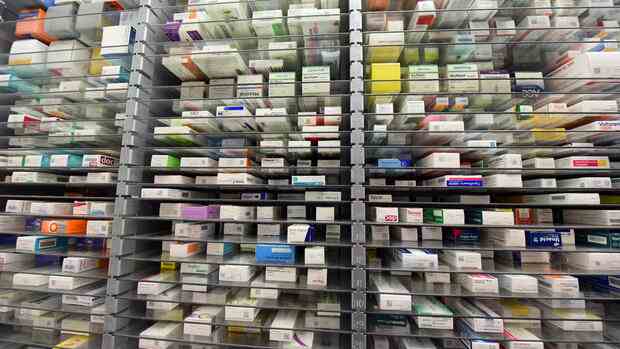Berlin The statutory health insurance companies (GKV) have decided on measures to alleviate the strained supply of children’s medication. The so-called fixed amounts for certain drugs with the active ingredients ibuprofen and paracetamol and for antibiotics are to be suspended for three months from February 1, 2023, as the GKV-Spitzenverband confirmed on Tuesday in response to a Handelsblatt request. The ARD had previously reported about it.
This means that the prices for a total of 180 finished medicinal products, including ibuprofen juices, paracetamol suppositories and antibiotic suspensions, are no longer capped. The pharmaceutical industry had complained that the production of such drugs was no longer worthwhile due to the sharp rise in costs.
The fixed price of a drug is the maximum amount that the statutory health insurance companies will pay for it. If the selling price is higher, patients usually pay the difference or receive an equivalent, cheaper drug from the pharmacy.
In the case of children’s medication, according to the information, parents do not have to fear any additional costs, even if the health insurance companies now incur higher costs for this.
Top jobs of the day
Find the best jobs now and
be notified by email.
In December, Minister of Health Karl Lauterbach (SPD) announced as a measure against the shortage that health insurance companies should pay more money for certain medicines in the future. The plan called for a 50 percent increase in fixed prices for certain drugs.
However, the cash registers pointed out that there is currently no legal basis for this. The decision to suspend the fixed amounts completely gives everyone involved time, as the GKV-Spitzenverband announced.
>>Read here: Lauterbach’s risky recipe against drug shortages
“The legislature must create legal requirements in order to structurally address the existing delivery problems in the supply of medicines,” the association continued. Allowing the pharmaceutical industry to raise prices in the short term is not a sustainable solution.
“We warn against the assumption that international pharmaceutical companies will change their global production sites and delivery processes just because people with statutory health insurance in Germany will have to pay higher drug prices with their health insurance contributions in the future.”
Companies therefore do not assume that the situation will ease in the short term as a result of the measures. Suspension of the fixed amounts will “not solve the problem of bottlenecks in the short term,” said the managing director of the Pro Generika industry association, Bork Bretthauer, to the Handelsblatt. “Because: Where are the fever juices supposed to come from all of a sudden?”
“Our companies produce around the clock”
The companies would currently produce around the clock. “There are no goods that could come onto the market in the short term just because the price increases for three months,” said the head of the association. “In the short term, no additional production is possible for the last remaining manufacturers, so that the situation cannot relax within a few months.”
Bretthauer called for “long-term incentives” for companies such as a suspension of discount agreements. “Otherwise the higher prices will be eaten up again directly by the other cost-saving instruments,” he said.
Lauterbach, on the other hand, hopes that the supply of medicines will increase if they are reimbursed more by health insurers. In addition, the focus should be more on European manufacturers in the future – and not on Asian ones, as is currently the case. The companies in Asia produce more cheaply, but have recently also been less reliable.
Manufacturers complain that business has become so uneconomical in recent years that some producers have withdrawn from the market. According to the industry association Pro Generika, the suppliers of paracetamol fever juices receive 1.36 euros per bottle, for example.
However, the active ingredient had become 70 percent more expensive within a year. In the meantime, only one main supplier is left – Teva with its drug brand Ratiopharm from Ulm.
In addition, 68 percent of the production sites for active ingredients that are intended for further processing in Europe are currently in Asia, which is less expensive, according to the study by the pharmaceutical association VFA. If there are production problems, contamination or a production standstill, this can also affect Germany.
With agency material.
More: What Lauterbach’s plans can actually do against the drug shortage.
